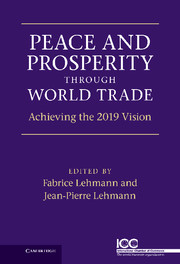Book contents
- Frontmatter
- Contents
- Notes on contributors
- Foreword
- Preface: the ICC vision
- Historical overview and dynamics
- Editorial note
- A Global systemic transformations
- B Governance of global trade
- Editorial introduction
- B1 Securing the global trade regime: the demand for global governance
- B2 The trade regime and the future of the WTO
- B3 WTO reform: the time to start is now
- B4 ‘Murky protectionism’ and the WTO
- B5 Preferential trade agreements: imagining a world with less discrimination
- B6 The G-20 after the Great Recession: rebalancing trade
- B7 The missing piece: global imbalances and the exchange rate regime
- B8 Trading knowledge fairly: intellectual property rules for global prosperity and environmental sustainability
- B9 Trade and subsidies: undermining the trading system with public funds
- B10 Trading labour: a dilemma for migration regimes
- C Poverty and global inequities
- D The long view on interlocking crises
- E Global business responsibilities
- Conclusion: the imperative of inclusive global growth
- Index
- References
B8 - Trading knowledge fairly: intellectual property rules for global prosperity and environmental sustainability
Published online by Cambridge University Press: 05 July 2011
- Frontmatter
- Contents
- Notes on contributors
- Foreword
- Preface: the ICC vision
- Historical overview and dynamics
- Editorial note
- A Global systemic transformations
- B Governance of global trade
- Editorial introduction
- B1 Securing the global trade regime: the demand for global governance
- B2 The trade regime and the future of the WTO
- B3 WTO reform: the time to start is now
- B4 ‘Murky protectionism’ and the WTO
- B5 Preferential trade agreements: imagining a world with less discrimination
- B6 The G-20 after the Great Recession: rebalancing trade
- B7 The missing piece: global imbalances and the exchange rate regime
- B8 Trading knowledge fairly: intellectual property rules for global prosperity and environmental sustainability
- B9 Trade and subsidies: undermining the trading system with public funds
- B10 Trading labour: a dilemma for migration regimes
- C Poverty and global inequities
- D The long view on interlocking crises
- E Global business responsibilities
- Conclusion: the imperative of inclusive global growth
- Index
- References
Summary
Innovation and creativity are vital to the world economy but the global intellectual property (IP) rules that govern trade in knowledge-related goods and services are a source of bitter dispute.
Creative industries – from entertainment and publishing to textiles and design – occupy an increasingly important place in many national economic strategies. Information technology companies are now among the world's most profitable. And the race to find better, cheaper cures for old and new diseases, develop greener energy sources and support more efficient production processes, has made policies that protect R&D investments and profits a top concern for business strategies. With one recent estimate valuing global IP assets at some US$300 billion, rules on intellectual property have grown rapidly in importance for many businesses over the past decade as they seek to gain legal security over the ownership of such rights and their enforcement.
But the global debate over IP rules, and especially over access to affordable medicines, has shown that IP laws can no longer be the domain of a small, specialized community of business lobbyists, IP officials, lawyers and international civil servants. Indeed, tensions over the appropriate rules for managing the creation, use and sharing of knowledge-intensive goods and services now engage a range of stakeholders in a vast and expanding array of global public policy debates, spanning issues as diverse as the environment and climate change, innovation, access to knowledge, education, public health, agriculture, the Internet, creative industries, biodiversity and food security, traditional knowledge, and genetic resources, as well as competition, industrial development, and science and technology.
- Type
- Chapter
- Information
- Peace and Prosperity through World TradeAchieving the 2019 Vision, pp. 109 - 113Publisher: Cambridge University PressPrint publication year: 2010

